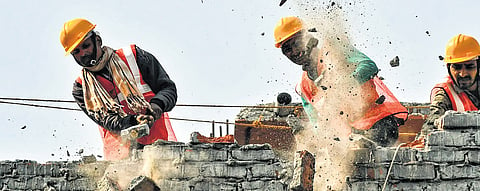

CHENNAI: With the GCC’s new Construction & Demolition Waste Management Guidelines set to be effective from April 21, the civic body is transforming C&D waste into construction materials — from fine sand and gravel to paver blocks through the Greater Chennai Corporation’s (GCC) C&D waste processing plants at Perungudi and Kodungaiyur dumping grounds.
Waste materials are being recycled into 6mm to 20mm aggregates, M sand (4.75mm to 2.5mm), and P sand (2.52mm to 0.75mm ). Even sludge from the treatment process is being reused as filling in construction or in the glass industry.
Recycled sand produced from concrete boulders using vertical shaft impactor technology is 30% cheaper than regular sand, said K Sundar, technical adviser of We Start Communications India Pvt Ltd - the firm operating the plants on the Public Private Partnership with GCC. It has also supplied the recycled materials to major firms like L&T and Corporation contractors.
With Chennai generating nearly 6,150 MT of solid waste, including 1,000MT of C&D waste daily, the corporation has classified waste generators into micro (up to 1MT), small (1-20MT), and bulk (above 20MT). While micro generators can take the debris to GCC’s secondary collection centres or request free pickup service via 1913 or the Namma Chennai app, small and bulk generators must pay `800 per tonne for processing.
Premier Precision Company, appointed by GCC, handles the collection, which clears debris from primary sites and moves it to secondary collection centres. It is then sent to Perungudi (zones 9-15) or Kodungaiyur (zones 1-8) plants. An official app ensures hired contractors upload before-and-after photos of clearance, with monitoring by zonal officials.
Each plant processes 100 tonnes per hour, using crushers, magnetic separators, log washers, flocculants, hydrocyclones and vibrating screens. The plant receives debris sizing up to 600 mm. Metals are separated using magnets. Lightweight waste like plastic and wood is removed during washing in log or power wash after crushing of debris, and 85% of water involved is reused. IIT-Madras has certified the quality of the recycled products and process, said Sundar.
Since January 7, the corporation’s clean-up drive has removed over 1 lakh tonnes of debris across all 15 zones.
GCC Assistant Commissioner Health V Jaya Chandra Bhanu Reddy urged the public to follow the waste guidelines and said clean construction guidelines will come into effect soon. Violators will face penalties ranging from `5,000 to `25,000 per day.